Can Obama heal the rifts?
Historians debate whether the US president can bridge the global divide.
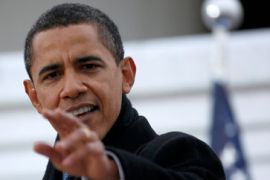
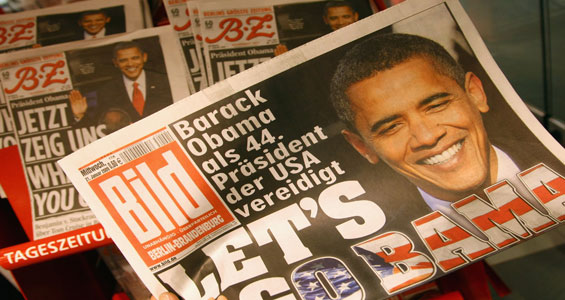 |
| Newspapers around the world have heralded a new era under Obama [GALLO/GETTY] |
As the son of Kansan and Kenyan parents and now the most powerful man on the planet, Barack Obama, the US president, may be in the best position to reverse the clash of cultures which has led to a world divided by conflict.
Analysts agree that Obama has a historic opportunity to expunge eight years of poorly-developed and increasingly divisive US foreign policies which seemed to be based on the theory that the West was on a collision course with the Muslim East.
The theory of “clash of civilisations” as the basis of post-Cold War conflicts was made popular by Samuel Huntington, an American political scientist who built on a catchphrase first coined by Bernard Lewis in his 1990 book The Roots of Muslim Rage.
In a 1993 article published in Foreign Affairs, Huntington said that the principal conflicts of global politics will occur between nations and groups of different civilisations, cultures and religions.
Afyare Abdi Helmi, a Somali-Canadian professor of political science at the University of Alberta, believes Obama’s election could quash the notion that the East and West are locked in perpetual conflict.
“Besides Obama’s roots and political background, there is consensus that Washington’s hawkish mentalities and policy prescriptions derived of Huntington’s clash of civilisations have failed.”
However, Abdi Helmi cautioned that “it will be very difficult for him to reverse the trend of polarisation in Washington”.
Birthing an empire
A polarisation began to take hold between major regions or groups of people following the end of political colonialism in the mid-20th Century.
Jakob Skovgaard-Petersen, the director of the Danish-Egyptian Dialogue Institute in Cairo told Al Jazeera: “Mutual distrust and a sense of incompatibility of values have been on the rise since the late 1970s, especially between parts of the Muslim world and the US and Western Europe.”
In the 1990s, US-based think tanks such as the Project for a New American Century (PNAC), which espoused the idea of American empire, capitalised on the clash of civilisations theory, saying it was inevitable that democratic cultures could soon be at war with more repressive regimes.
These ideas grew in prominence thanks largely to talk radio which became the favourite breeding ground for anti-liberal thinking.
Neoconservatives attacked the liberal politics of Bill Clinton, the former US president, on everything from abortion and gays in the military to social welfare programmes and urged him to invade, occupy and institute regime change in Iraq as early as 1997.
It was during this time that Huntington’s ideas allowed media pundits such as Bill O’Reilly and Michael Savage to apply the fiery jargon of ‘us-and-them’ to describe the Muslim world – rhetoric that was later borrowed by Bush as a post-9/11 slogan – “you’re either with us, or against us”.
Embracing Huntington
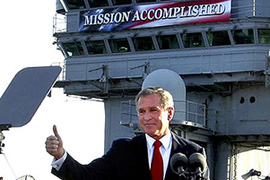 |
| Bush declared the war won in May 2003, but Iraq quickly plunged into chaos [AFP] |
The Bush presidency divided the world into allies and axis, good and evil as it prepared to wage perpetual war on terror.
“The US created the international situation which made space for ‘clash of civilisation’ rhetoric,” says Madeleine Hurd, a professor of history at Södertörn University College in Stockholm.
“This is well-suited by a confrontational, exclusionary, [and] polarised way of conceiving of the enemy – as people so different that no communication would be possible,” she told Al Jazeera.
Phrases such as “they hate our way of life” helped breed contempt and distrust in the American neoconservative movement and paved the way for some media commentators to call for the invasion of Islamic countries.
Ann Coulter, a syndicated columnist and critic of Washington liberals, called on US forces to “invade their [Muslims] countries, kill their leaders and convert them to Christianity,” shortly after 9/11.
Such ideas helped to popularise the Bush doctrine which called for pre-emptive war – “to get them before there is a mushroom cloud over a US city” – and the aggressive instilling of Western democratic mechanisms in such “terrorist breeding grounds” as Iraq, Lebanon, Afghanistan and Sudan.
Mark LeVine, a professor of Middle East history at the University of California, Irvine, and the author of Heavy Metal Islam: Rock, Resistance, and the Struggle for the Soul of Islam, believes Huntington’s theories empowered and emboldened the neoconservatives in the Bush administration.
“[Huntington] gave them the intellectual legitimacy they needed,” LeVine told Al Jazeera.
“It is not surprising that the theory that he developed was used to justify imperial conquest and systematic war crimes by the current generation of neoconservatives.”
Debunking the clash
David Dionisi, a former military intelligence officer and author of American Hiroshima, says Huntington’s theses were also embraced by power-brokers who longed to see a world divided by conflict. He says Huntington’s works were repeatedly cited in speeches by the Bush cabinet in the build-up to the Iraq war.
“Huntington is wrong as evident by many examples including the close collaboration between the US and Saudi governments,” Dionisi said.
“Huntington’s famous ‘Islam has bloody borders’ theory highlights a deception of blaming the Muslim world when in fact much of the blood has been spilled in the pursuit of oil,” he told Al Jazeera.
Dionisi said Huntington disregards the multiple-identity affiliations of people and the dynamic interaction of cultures choosing instead to reach conclusions which have only promoted fear and violence.
Nevertheless, some historians point out that Huntington’s theories will continue to find an audience.
Hurd believes that the processes that increasingly challenge the notion of a clash of civilisations are precisely those that give it salience.
“Fortress Europe is a direct response to popular fear that cultural and material fluidity, as alarmingly embodied by Muslim immigrants, will deprive ‘us’ of ‘our’ space, homes and identities,” she told Al Jazeera.
“Fear leads to the reification of our culture and it becomes rigid and idealised, unchangeable and perfect.”
Empire is stillborn
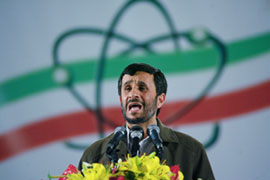 |
| Despite the Bush doctrine, Iran has emerged as a powerful force in the Middle East [GETTY] |
However, the early debacle in Iraq – along with the hundreds of billions in missing reconstruction monies, the resurgence of the Taliban, the rise of a more confident Iran determined to develop a nuclear programme, the North Korean crisis and more recently Russia’s snubbing of the US as it ploughed through Georgia, a Washington ally, proved that America could not fight on several fronts at once.
It needed allies and trading partners.
Juan Cole, a professor of history at the University of Michigan and the president of the Global Americana Institute, says that Huntington’s theories were further challenged by America’s realisation that it could not function as an unchallenged superpower.
“In the Muslim world, Turkey is a Nato ally, while Morocco, Egypt, Jordan, Kuwait, and Pakistan have been designated non-Nato allies,” he said.
“The theory of clash of civilisations doesn’t accord with international diplomatic reality. Wouldn’t Taiwan, China and North and South Korea all be ‘Confucian’? Yet, Taiwan and South Korea are US allies, North Korea is an enemy and China is a major trading partner,” he said.
The housing crisis, numerous bailouts and the overall economic downturn further undermined the political ideologies the neoconservatives supported.
The recent financial crisis has encouraged a populist backlash against the corporate elite, Hurd says.
“The Bush government had been very closely associated with these corporate elite, and so Bush’s downfall on other fronts reinforced the political disillusionment with this group [neoconservatives],” she said.
Suddenly, the ‘them’ were being asked to finance and resuscitate Western economies; Gordon Brown, the British prime minister, toured the affluent Gulf nations seeking a cash injection to keep the International Monetary Fund and the European banking industry afloat.
Arab sovereign wealth funds, such as Abu Dhabi’s – at $850 billion the largest in the world – started to buy into European markets.
Reversing trends
Experts believe that this growing disillusionment coupled with the failures in Iraq and the global recession offer Obama a unique prospect to recreate domestic and foreign policies.
“I think Obama has been given a fantastic opportunity to use his eloquence to address and inspire people all over the world,” Skovgaard-Petersen told Al Jazeera.
Thomas B Wilner, a lawyer representing Guantanamo detainees in the US Supreme Court, believes that an incoming Obama presidency inherits a great opportunity to remove the tarnish that has stained America’s reputation abroad.
Writing in the International Herald Tribune recently, Wilner called on Obama to shut down the Guantanamo Bay detention facility, which he believes has contributed to America’s decline in status.
Obama has promised to reach out and listen to nations and groups who have felt unfairly targeted and disenfranchised in the past years.
During his campaign speeches, he hinted he was willing to engage with Iranian leaders and later host a summit of Muslim leaders from around the world.
He repeated these pledges during is inauguration speech on January 20.
Obama’s outreach
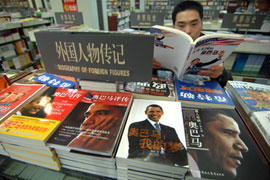 |
| Obama’s promise of dialogue has made him popular in China [EPA] |
Ahmed El-Meslemany, a political analyst at Al Ahram, Egypt’s oldest daily newspaper, believes Obama enjoys mass appeal not merely because he is the first African-American president but also because he is viewed as a global citizen, and therefore the world’s president.
“Obama’s greatest achievement would be starting a new era. People around the world believe that he understands the conditions of the under-privileged because he is one of them,” El-Meslemany said.
Andrew Young, the chairman of Goodworks International, a global advisory firm, echoed that statement when he recently told Time magazine that Obama is not just black, but Afro-Asian-Latin-European.
It is these beliefs, El-Meslemany says, that have idealised Obama as the president who “will be more understanding of Africa’s and the Middle East’s needs”.
International media appears to have caught on to Obama’s global appeal.
“And also because as the child of a Kansan and a Kenyan he reconciles in his own person one of the world’s most hateful divisions, Mr. Obama carries with him the hopes of the planet,” said an editorial in the January 17 edition of The Economist.
“Obama is nearly finished forming his multi-ethnic cabinet,” Al Ahram said on the front page of one of its editions in late December.
Qatar’s Peninsula called Obama’s presidency “A New Era”.
Skovgaard-Petersen believes that Obama, ironically, has received a global sympathy that echoes the outpouring of solidarity with the US following the 9/11 attacks.
He told Al Jazeera that Obama’s global reach is a reaffirmation that the US is also a microcosm of the world, sharing common beliefs, basic political rights and values with other nations.
“After a period where leading American thinkers espoused ideas of American empire and other more aggressive interpretations, Obama’s election seems to confirm the world’s optimistic and positive understanding of the US,” he said.
Obama’s challenges
Yet some historians are signaling that the Obama presidency is unlikely to overturn decades of foreign policy overnight.
Abdi Elmi believes Obama’s election has weakened the ‘us-and-them’ mentality but may not be able to erase it entirely.
“That narrative will remain within the US foreign policy-making circles because various actors that are equipped with this ideology within and outside government will still have significant influence,” he said.
Hurd agrees that conservative forces such as Christian evangelicals still hold considerable sway in domestic politics.
“They will continue to maintain this divide as will those Muslim fundamentalists in various countries who have equal use for this type of polarising, exclusionary rhetoric,” she said.
However, LeVine believes that Obama will stray little from past US policies.
“Obama talks a good game, but action is what matters. The neoconservatives are not going into hiding; rather they are waiting for the next disaster to happen to prove that Obama is an appeaser and that the conflict is inevitable between a rational enlightened West and irrational hate-filled Islamic world,” he said.
LeVine believes that Obama will be unable to rewrite the policy handbook on Middle East crises.
He said: “Obama would have to radically reorient US foreign policy towards the region, and judging by his Middle East team, there is little chance of that happening.”
Huntington died on December 24, 2008.